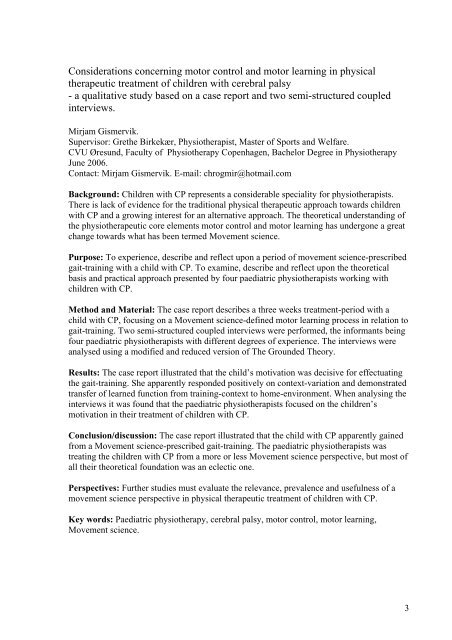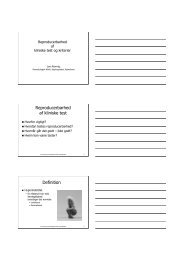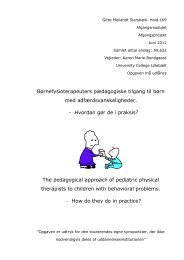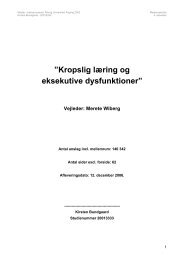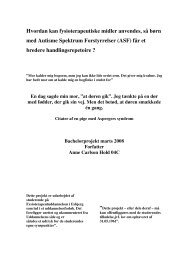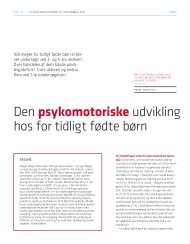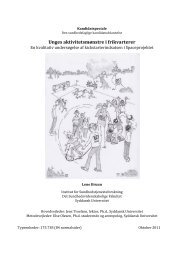Læs hele bacheloropgaven her - Børnefysioterapi
Læs hele bacheloropgaven her - Børnefysioterapi
Læs hele bacheloropgaven her - Børnefysioterapi
Create successful ePaper yourself
Turn your PDF publications into a flip-book with our unique Google optimized e-Paper software.
Considerations concerning motor control and motor learning in physical<br />
t<strong>her</strong>apeutic treatment of children with cerebral palsy<br />
- a qualitative study based on a case report and two semi-structured coupled<br />
interviews.<br />
Mirjam Gismervik.<br />
Supervisor: Grethe Birkekær, Physiot<strong>her</strong>apist, Master of Sports and Welfare.<br />
CVU Øresund, Faculty of Physiot<strong>her</strong>apy Copenhagen, Bachelor Degree in Physiot<strong>her</strong>apy<br />
June 2006.<br />
Contact: Mirjam Gismervik. E-mail: chrogmir@hotmail.com<br />
Background: Children with CP represents a considerable speciality for physiot<strong>her</strong>apists.<br />
T<strong>her</strong>e is lack of evidence for the traditional physical t<strong>her</strong>apeutic approach towards children<br />
with CP and a growing interest for an alternative approach. The theoretical understanding of<br />
the physiot<strong>her</strong>apeutic core elements motor control and motor learning has undergone a great<br />
change towards what has been termed Movement science.<br />
Purpose: To experience, describe and reflect upon a period of movement science-prescribed<br />
gait-training with a child with CP. To examine, describe and reflect upon the theoretical<br />
basis and practical approach presented by four paediatric physiot<strong>her</strong>apists working with<br />
children with CP.<br />
Method and Material: The case report describes a three weeks treatment-period with a<br />
child with CP, focusing on a Movement science-defined motor learning process in relation to<br />
gait-training. Two semi-structured coupled interviews were performed, the informants being<br />
four paediatric physiot<strong>her</strong>apists with different degrees of experience. The interviews were<br />
analysed using a modified and reduced version of The Grounded Theory.<br />
Results: The case report illustrated that the child’s motivation was decisive for effectuating<br />
the gait-training. She apparently responded positively on context-variation and demonstrated<br />
transfer of learned function from training-context to home-environment. When analysing the<br />
interviews it was found that the paediatric physiot<strong>her</strong>apists focused on the children’s<br />
motivation in their treatment of children with CP.<br />
Conclusion/discussion: The case report illustrated that the child with CP apparently gained<br />
from a Movement science-prescribed gait-training. The paediatric physiot<strong>her</strong>apists was<br />
treating the children with CP from a more or less Movement science perspective, but most of<br />
all their theoretical foundation was an eclectic one.<br />
Perspectives: Furt<strong>her</strong> studies must evaluate the relevance, prevalence and usefulness of a<br />
movement science perspective in physical t<strong>her</strong>apeutic treatment of children with CP.<br />
Key words: Paediatric physiot<strong>her</strong>apy, cerebral palsy, motor control, motor learning,<br />
Movement science.<br />
3


